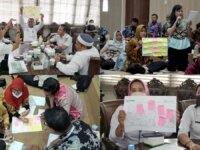Complex government documents may confuse citizens, making it difficult to access services such as pensions or benefits. This work engages GenAI to rewrite these texts in plain language, maintaining legal accuracy while increasing clarity. Focused on the Service Pages of Italy's National Institute of Social Security portal, which serves 45 million users, AI surpassed human experts in user preference, enabling the Institute to communicate inclusively and at scale.
Case Study Library
Where innovations are collected and shared to disseminate and replicate good ideas

Innovations:
0
This website, as well as any data and map included herein, are without prejudice to the status of or sovereignty over any territory, to the delimitation of international frontiers and boundaries and to the name of any territory, city or area.
The study integrates Artificial Intelligence (AI) techniques, and a digital twin methodology to process and interpret urban data streams derived from citizen interactions with the city's coordinate-based problem mapping platform. Using an interactive GeoDataFrame within the digital twin methodology, dynamic entities facilitate simulations based on various scenarios, allowing users to visualize, analyze, and predict the response of the urban system at
Case Study
Thematic Innovation Clinic to improve the quality and quantity of public service innovations

Thematic Innovation Clinic was implemented to encourage and increase number and quality of innovations in Pontianak City. This program succeeded in increasing the number of innovations within the Pontianak City Government to 165 innovations in 2022, and to 196 innovations in 2023. With a design thinking approach, the innovation clinic increases the number of innovations, fosters the spirit and culture of innovation, and cross-party collaboration to deliver optimal public services to community.
Zaragoza City Council has launched a new electronic citizen participation platform with the aim of involving its citizens in public policy decisions and in the design of its services. It provides an interactive space for residents to actively contribute, strengthening the collaboration between the administration and the community, thus fostering a more inclusive and transparent management.
The National Injury Insurance Agency Queensland in partnership with Queensland University of Technology is revolutionising support for those severely injured in accidents by offering a digital platform for easier access to services and self-management. This initiative provides a seamless, empowering user experience, enhancing independence and trust in public support systems. It's innovative because it transforms traditional, paper-based processes into an accessible, efficient digital solution.
People are demanding increased transparency and participation in government decision-making processes. Project Heart brought together people with lived experience, researchers, designers, and policy analysts to co-envision a way for engagement to be meaningful and bring about more caring and equitable futures for all. The findings are a rallying call for governments to change common practices and move towards co-designing policies/programs as a path to (re)building community relationships.
In New Zealand, a new unit in the Ministry for the Environment / Manatū Mō Te Taiao was set up. This new unit was a deliberate decision to focus on behavioural science, systems thinking, design thinking and human system-dynamics to help the organisation, designing for the systems we focus on. It is innovative because it is bringing this type of thinking together in a single team, embedding this in a policy organisation, using the multidisciplinary skills.
Launched in 2021, the Smart Agriculture Boxes Project aimed to address critical challenges faced by farmers in Mpumalanga South Africa through the creation of an growing box. These challenges included limited land availability, water scarcity, and the imperative for sustainable agricultural practices. The box has a water-efficient design, maximizes crop yields, and is mobile and relocatable.
The initiative recognized the profound impact of these issues on food security, poverty, and…
The Digital Agency spearheaded the Policy Data Dashboard Project with an agile approach to visualize policy progress and propogate a culture centered on data. The project aims to effectively integrate data into policymaking by first creating an intuitive dashboard interface. To disseminate this data-centered culture, the project members are developing a design system guideline to empower civil servants in other central ministries and local administrations to create dashboards independently.
Fish production within water supply reservoirs is an important socioeconomic activity, but it causes pollution due to the significant release of nutrients into the water. This project developed a new tool that has assisted government in making decisions regarding the permitted input loads of nutrients from fish farms. Before the project, there was no methodology to predict the permitted pollutant loads for a sustainable management of reservoirs located in tropical semiarid regions. The hope is…




